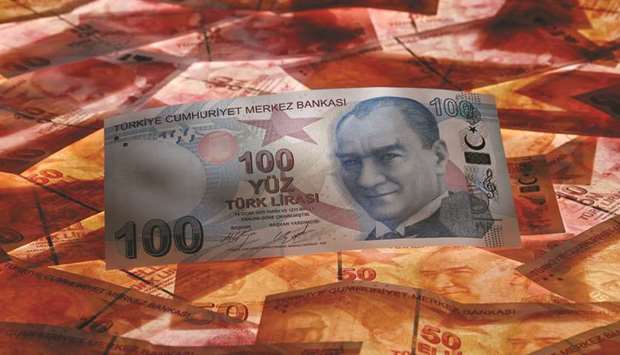Turkey delivered a ninth straight interest-rate cut in less than a year, acting with more restraint as the central bank looks to strike a balance between stimulating the economy and shielding a currency still trading near an all-time low.
The Monetary Policy Committee, led by governor Murat Uysal, reduced its benchmark on Thursday to 8.25% from 8.75%, in line with the forecasts of most economists in a Bloomberg survey.
The lira erased losses against the dollar after the announcement.
The MPC described the decision as a “measured cut.” Unlike its statement in April, the latest assessment didn’t include a sentence that described risks to the central bank’s year-end inflation forecasts as being “on the downside.”
“Although consumer inflation might follow a slightly higher course in the short term due to seasonal and pandemic-related effects on food prices, demand-driven disinflationary effects will be more prevalent in the second half of the year,” the central bank said.
Turkey’s inflation slowed less than forecast last month as a sudden jump in food prices offset some of the impact from a slump in global oil markets and weak demand. In April, the central bank lowered its inflation expectations for the end of this year to 7.4%, less than a previous forecast of 8.2%.
Authorities have escalated their defence of the lira to leave some room for lower borrowing costs, a linchpin of the government’s strategy to keep cheap credit flowing to consumers and businesses as it tries to mitigate the economic fallout from the coronavirus outbreak. The latest cut pushed the policy rate to negative 2.69% when adjusted for inflation, one of the lowest levels in the world.
Turkey’s currency is now hovering around its strongest level in over a month, despite having snapped a nine-day winning streak on Wednesday that propelled it back from a record low. It’s still down around 12.4% since the beginning of the year.
Although the prospect of ever-looser monetary policy threatens to weaken the lira, traders say taking positions against the Turkish currency has become a risky proposition for foreign investors, who once accounted for the bulk of activity in this market. In their absence, Turkish banks are playing an outsized role in stabilising the lira.
On average, foreign investors made up just under a third of all lira trades executed with local lenders over the past 30 trading days through May 11, according to central bank data and Bloomberg calculations. That’s the lowest share in a decade, and down from a high of 65% in 2018. Meanwhile, trades between Turkish lenders made up 37% of the market, the most on record.
Earlier this month, the banking regulator briefly barred local lenders from trading with Citigroup Inc, UBS Group AG and BNP Paribas SA. While the ban was lifted within days, BNP has stopped offering new lira trades to clients at its foreign-exchange prime-brokerage unit, according to people familiar with the matter.
“The lira has been defying the odds in recent days,” said Phoenix Kalen, a strategist at Societe Generale SA in London, before the decision. “This marked resilience may be attributable to continued currency interventions via state banks, regulatory interventions that magnified the risk of speculative short lira positions,” and speculation that Turkey may be close to securing a currency swap line.

A 100 Turkish lira banknote is seen on top of 50 lira banknotes in this picture illustration in Istanbul (file). The currency is now hovering around its strongest level in over a month.
